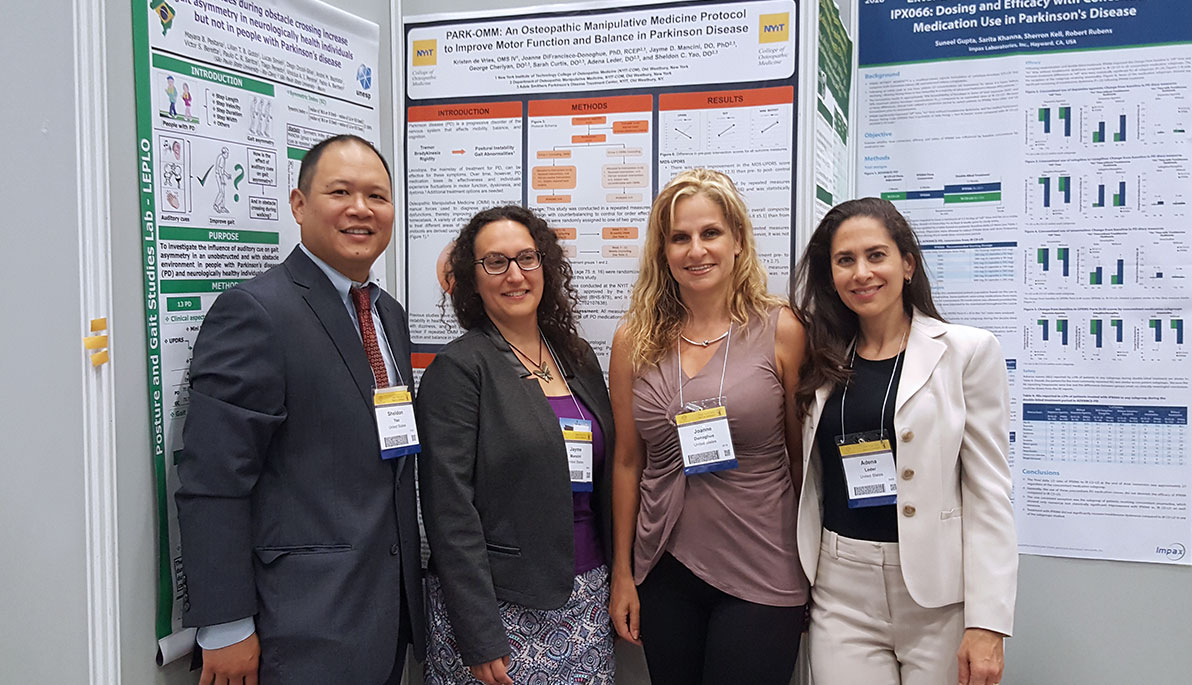News
NYITCOM Faculty Present Parkinson’s Disease Research at International Conference
July 7, 2016
Pictured (left to right): NYIT faculty members Sheldon Yao, D.O.; Jayme Mancini, D.O., Ph.D.; Joanne Donoghue, Ph.D.; and Adena Leder, D.O.
Four faculty members from NYIT College of Osteopathic Medicine (NYITCOM) presented their research on Parkinson’s disease at an international conference in June. They joined top neurologists in Berlin, Germany, for the 20th International Congress of Parkinson's Disease and Movement Disorders to learn more about ongoing studies that may improve patient care and treatment.
Among the abstracts the faculty presented was a study on using osteopathic manipulative medicine (OMM) to improve motor function and balance in Parkinson’s patients. Osteopathic physicians use hands-on techniques to diagnose and treat injuries or dysfunction in the body. The study has been accepted for publication in the journal Neurorehabilitation.
“This is the one of the few times that osteopathic studies on Parkinson’s disease have been presented at an international neurologic conference,” said Assistant Professor Joanne Donoghue, Ph.D., an exercise physiologist who was involved in three of the research projects, including the one on motor function and balance. “What we’re doing here at NYITCOM is relevant to the field. The clinical neurologists were asking us how to implement some of our findings in their practices and asking about the next stages of our research.”
The second of Donoghue’s studies focused on using nicotine gum to treat acute low blood pressure in patients with Parkinson’s disease. A third examined the reliability of a sensory test to predict falls in patients.
The other faculty members who presented research posters were Sheldon Yao, D.O., chair of the Osteopathic Manipulative Medicine Department; Jayme Mancini, D.O., Ph.D.; and Adena Leder, D.O. Several second-, third-, and fourth-year NYITCOM medical students were also involved in the research.
One of Mancini’s studies found OMM resulted in postural improvements and a decrease in pain in Parkinson’s and dystonia patients, who have a condition that causes involuntary movements or muscle contractions. The other study indicated that OMM helped improve the gait of some patients with cervical dystonia.
“The posters gave more international exposure to osteopathic medicine and the treatment of different movement disorders,” said Yao. “What I remember hearing is doctors saying: ‘this is great because the Parkinson’s patients need other treatment modalities because drugs are not the only answer.”
Yao added that his department is dedicated to “building a culture of increased scholarly activity,” with research that will focus on the various effects of OMM on athletes and patients with Parkinson’s, concussions, and other issues. While the pilot studies involve relative small numbers of patients, they provide information and results that the department can use to build a stronger research base, said Yao.




